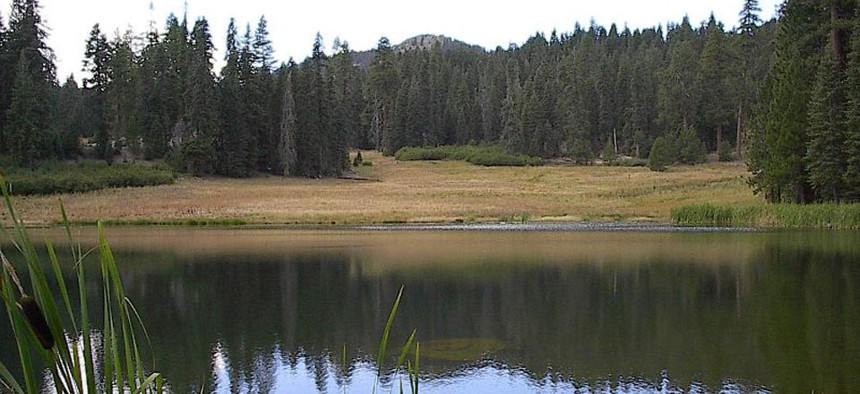
In its final days, the Clinton administration protected hundreds of acres of forest, including Mendocino National Forest. United States Forest Service file photo
Here's How Obama Can Go It Alone
The biggest problems can't be solved with simple, unilateral solutions. But that doesn't mean he's powerless.
President Obama is right that through his remaining months he can leave his deepest imprint primarily through unilateral actions that don't require congressional cooperation. But they aren't the actions he highlighted the most in this week's State of the Union.
In the speech, Obama offered a coherent vision of the president as catalyst and cheerleader. He correctly argued that while the country is stalemated in Washington, businesses, local governments, and nonprofit organizations still show enormous vitality in confronting big problems ranging from education to stagnant incomes. With vigor, he pledged to mobilize the innovators already driving that change. Congress, he insisted, could join him—or stand aside and marginalize itself.
The mission Obama defined of crystallizing bottom-up innovation is a worthwhile, even creative, use of presidential authority. But for all its virtues, this approach contains a huge hole: Bold federal action is still the president's most important lever to accelerate grassroots change. It's as if Obama sought to expand health care coverage by convening a White House conference of small employers who are already insuring their workers and providing a favorable interpretation of tax law to nudge others. He covered incalculably more people by passing through Congress the health reform law that had eluded his predecessors.
And for all the with-or-without-you brio, Obama has few chances to reach such significant legislative agreements with congressional Republicans. On immigration, the House GOP this week cracked open the door to legal status for the 11 million immigrants here without documents—but the road to agreement remains long. William Galston, a veteran Democratic thinker, also sees opportunities in tax reform that might simultaneously fund infrastructure spending. But many other observers would be surprised if Republicans in Congress, believing that the botched Obamacare rollout has provided them the 2014 edge, throw Obama the lifeline of any big legislative accomplishments.
That prospect understandably tilts the president back toward unilateral action. But promulgating more executive orders, or convening innovators, isn't the most influential form of such action available to him. Obama could make a deeper mark by effectively executing two major initiatives he's already launched: health reform and regulation of the carbon emissions linked to climate change. Apart from immigration, no other domestic priority plausibly within Obama's reach will affect America's future—or his legacy—as much as whether he can finish what he's started on those fronts.
The problem is that implementation of big initiatives hasn't been exactly a strong suit for Obama, only the third sitting senator ever elected president. "He has the policymaking instincts of a senator more than the administrative instincts of an executive," says Donald F. Kettl, dean of the University of Maryland public-policy school.
Exhibit A in Kettl's case is the disastrous rollout of the health care website, which reenergized GOP opposition to the overall plan. No other policy achievement through Obama's remaining time could rival entrenching Obamacare to the point where even a Republican president and Congress in 2017 could not realistically repeal it. But that would require a persistent attention to administrative detail that expands coverage in a demographically balanced way and builds public support, particularly in the medical community. "He has the potential for a monumental legacy in Obamacare," Kettl says. "But if he fumbles the administration, he … provides unending opportunities for Republicans, both to attack the program and undermine his party."
On energy, Obama's fate remains as much in his hands. Completing the two regulations the Environmental Protection Agency is writing to limit carbon emissions from new and existing power plants would change how America uses energy more than anything else the president might do. Once completed, those rules would impel a historic shift away from coal for generating electricity toward lower-carbon options such as natural gas and renewables.
Here, Obama's challenge is ensuring that these complex rules are finalized, in a legally defendable form, before he leaves office. He's directed EPA to finish both rules by June 2015, an ambitious pace. If that schedule slips past his term, it becomes much easier for a Republican successor to reverse course (as George W. Bush did with Bill Clinton's unfinished proposal to regulate mercury pollution). But "if the final guidelines have been promulgated, it makes it much tougher to modify [because] there would have to be a formal rulemaking to change the rule," notes environmental consultant Dina Kruger, former director of EPA's climate office.
One person who well understands this dynamic is John Podesta, Obama's new senior adviser. One of Podesta's proudest achievements as President Clinton's last chief of staff was completing regulations protecting nearly 60 million acres of national forests from development. Those regulations weren't finished until eight days before Clinton left office. But when the succeeding Bush administration tried repeatedly to reverse them, it was blocked by the courts and skeptical governors, and the rules remain in force today. New proposals and sweeping visions wouldn't secure Obama's legacy nearly as much as ensuring that he leaves his carbon regulations and health care reform in equally defensible positions.
This article appears in the February 1, 2014, edition of National Journal Magazine as Going It Alone.







